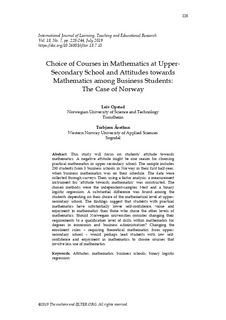Choice of Courses in Mathematics at Upper-Secondary School and Attitudes towards Mathematics among Business Students. The case of Norway.
Journal article, Peer reviewed
Published version

Åpne
Permanent lenke
http://hdl.handle.net/11250/2617964Utgivelsesdato
2019Metadata
Vis full innførselSamlinger
Originalversjon
Opstad, L., & Årethun, T. (2019). Choice of Courses in Mathematics at Upper-Secondary School and Attitudes towards Mathematics among Business Students: The Case of Norway. International Journal of Learning, Teaching and Educational Research, 18(7), 228-244. 10.26803/iijlter.18.7.15Sammendrag
This study will focus on students’ attitude towards mathematics. A negative attitude might be one reason for choosing practical mathematics in upper secondary school. The sample includes 230 students from 3 business schools in Norway in their first half-year, when business mathematics was on their schedule. The data were collected through surveys. Then, using a factor analysis, a measurement instrument for ‘attitude towards mathematics’ was constructed. The chosen methods were the independent-samples t-test and a binary logistic regression. A substantial difference was found among the students depending on their choice of the mathematical level at upper-secondary school. The findings suggest that students with practical mathematics have substantially lower self-confidence, value and enjoyment in mathematics than those who chose the other levels of mathematics. Should Norwegian universities consider changing their requirements to a qualification level of skills within mathematics for degrees in economics and business administration? Changing the enrolment rules – requiring theoretical mathematics from upper-secondary school – would perhaps lead students with low self-confidence and enjoyment in mathematics to choose courses that involve less use of mathematics.